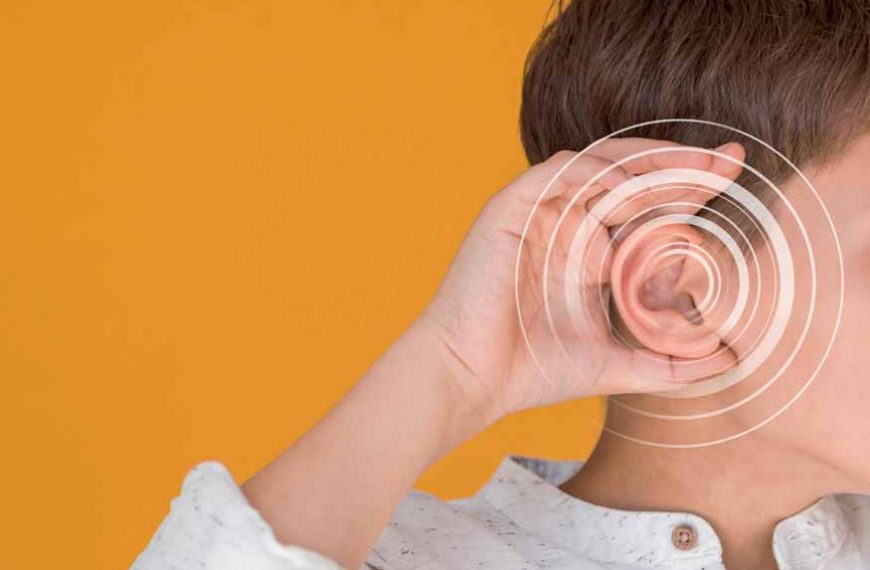Hearing plays a vital role in the overall development of infants and toddlers as it allows them to learn, communicate, and interact with the world around them. Early identification of hearing impairment is important for providing the necessary support as it can affect their social and emotional development. In this blog post, you can explore indicators of hearing impairment in young children, emphasising the importance of early detection and intervention.
Hearing Loss in Children
Hearing loss can be either short-term or long-term. Depending on the type and reason for their hearing loss. However, ear tubes, surgery, or medications may restore your kid’s hearing. With technologies such as hearing aids or cochlear implants, children with chronic hearing loss can typically hear some noises. Early intervention can be very helpful in assisting your child in developing language and communication skills.
What is Hearing Impairment?
Hearing loss in children can occur when a part of the ear does not function properly. This comprises the middle ear, inner ear, outer ear, hearing (acoustic) nerve, and auditory system. It could be caused by a congenital abnormality, an injury, an illness, certain medications, loud noise exposure, or age-specific tear and wear.
Signs and Symptoms
Each child’s signs and symptoms of hearing loss are unique. If you suspect your kid has hearing loss, make an appointment with your child’s doctor as soon as possible. Don’t be late. Even if a child has previously passed a hearing screening, it is critical to observe for the following indicators:
Hearing Impairment Issues with Infants
- Not being shaken by loud noises.
- Even after 6 months, he does not turn toward a sound.
- By the time he is one year old, he is incapable of saying single words like “mama” or “dada”.
- When he sees you, he turns his head, but not if you just call out his name.
- Some sounds appear to be heard but not others.
Hearing Impairment Issues in Toddlers
- Frequently says, “Huh?”
- Raises the volume too high while watching television or other listening devices.
- Does not listen to instructions. This is commonly misinterpreted as not paying attention or simply ignoring, although it could be the result of a partial or whole hearing loss.
- They are able to talk and hear at home but not in school because of mild or moderate hearing impairment. Check if they feel exhausted at the end of a school day.
- It can also be academic, behavioural, or psychological problems at school (for example, literacy, pragmatics, social interaction, and cognitive function).
Types of Hearing Impairment:
Hearing loss in kids can take many different forms and severity levels. The following are some of the most common types of hearing impairment in Infants and Toddlers:
- High-Frequency Hearing Loss: This type of hearing loss affects the capacity to hear sounds at higher frequencies. It can make it difficult for children to hear spoken sounds, impacting their communication ability and language development.
- Sensorineural Hearing Loss: Damage to the inner ear (cochlea) or the auditory nerve causes sensorineural hearing loss. It is usually lifelong and can be caused by hereditary factors, loud noise exposure, certain drugs, or illnesses. Sensorineural hearing loss can be controlled with hearing aids or cochlear implants.
- Mixed Hearing Loss: This form of hearing loss consists of both conductive and sensorineural hearing loss. Usually, it is caused by conditions like persistent ear infections combined with pre-existing sensorineural hearing loss.
- Conductive Hearing Loss: This type of hearing impairment happens when sound transmission via the outer or middle ear stops. Some common causes of conductive hearing loss are ear infections, earwax blockage, or structural abnormalities in the ear. Congenital hearing loss is commonly treated with medicinal or surgical procedures.
- Auditory Processing Disorder (APD): APD is a condition in which the brain has issues appropriately processing sounds. Children with APD may have normal hearing but have difficulty understanding speech, particularly in noisy situations. It is not a standard hearing loss, but it can impair a child’s ability to understand and respond to spoken language.
Conclusion:
Comprehensive hearing examinations performed by audiologists or hearing experts are required to determine the particular kind and degree of hearing impairment in infants and toddlers. Early detection and proper interventions, such as hearing aids, cochlear implants, or therapy, can enhance a child’s communication and general development dramatically.
A child’s ability to develop speech, language, and social skills might be hindered by hearing impairment. The earlier children with hearing loss receive treatment, the more probable it is that they will realise their full academic potential. If you feel your child has hearing loss, trust your intuition and consult with your child’s doctor as it can have a negative influence on a child’s development and quality of life if it is not treated early.
EuroKids, a renowned play school is known for its commitment to providing a safe and supportive learning environment for children with hearing impairment. EuroKids assures that no kid is left behind by providing an inclusive setting in which children of all abilities learn and excel together.
Frequently Asked Questions (FAQs)
- What are the most common indications of hearing loss in children that parents should be aware of?
- Is hearing impairment in kids usually temporary or permanent?
- What steps may parents take to protect their child’s hearing?
- Is there any long-term impact or risk of difficulties linked with untreated hearing loss in children?
- Can hearing loss in children improve with time, or is it a lifelong condition?
Common symptoms of hearing loss in children include delayed speech, lack of responsiveness to noises, and recurrent ear infections. These symptoms may point to the necessity for hearing screening.
Depending on the root cause, hearing impairment in kids might be temporary or permanent. For example, ear infections can cause temporary hearing loss, but congenital or genetic issues might cause lasting hearing impairment.
While certain causes of hearing loss are unavoidable, parents may safeguard their child’s hearing by limiting their child’s exposure to loud noises, ensuring vaccines to prevent certain illnesses, and proper treatment of ear infections.
Yes, untreated hearing loss in children can have long-term consequences such as delayed language development, social isolation, and emotional disorders. To avoid these problems, early intervention is important.
Depending on the source and kind of hearing loss, a child’s hearing impairment may or may not improve over time. Hearing impairment caused by ear infections or blockages, for example, may improve or disappear with adequate treatment.
Disclaimer: The information on this webpage is not intended to be a substitute for proficient medical advice. It is not meant to diagnose, treat, cure, or prevent any disease. EuroKids encourages you to consult with a qualified healthcare professional for any health concerns you may have.
















